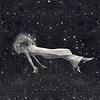Take a photo of a barcode or cover
I read the 1855-version, which is only 12 poems including "Song of Myself". It is only around 140 pages. Thank God for that.
This "barbaric yawp" of a poem has not aged well. The I's presumption of being able to speak for everyone, of believing in the inner equality of all, to the point where all social, historical and material differences are wiped out, has, obviously, not turned out well for the American Dream. Whitman's "Open Road" goes, as the poet Louis Simpson has it, "to the used-car lot".
What infantile violence there is in a language that wishes every difference to be wiped out and replaced by some ineffable, universal, American soul, in order for the reality of the I to go unchallenged.
"Song of Myself" does have its moments of lyric quality, but without any recourse to actual social reality, the grand words of Whitman, such as "democracy", and his long listings of American entities fall flat on the page.
That this is the American poem is, sadly, rather fitting. Brutally innocent, proudly ignorant, and written by a Whit(e)man.
This "barbaric yawp" of a poem has not aged well. The I's presumption of being able to speak for everyone, of believing in the inner equality of all, to the point where all social, historical and material differences are wiped out, has, obviously, not turned out well for the American Dream. Whitman's "Open Road" goes, as the poet Louis Simpson has it, "to the used-car lot".
What infantile violence there is in a language that wishes every difference to be wiped out and replaced by some ineffable, universal, American soul, in order for the reality of the I to go unchallenged.
"Song of Myself" does have its moments of lyric quality, but without any recourse to actual social reality, the grand words of Whitman, such as "democracy", and his long listings of American entities fall flat on the page.
That this is the American poem is, sadly, rather fitting. Brutally innocent, proudly ignorant, and written by a Whit(e)man.
I struggled with this one my first attempt to read. I really don't love poetry and seldom find a connection to it. My second attempt was a bit better and I found several of the poems I enjoyed and a few resonated with me. The majority, however, were hard for me to appreciate.
hopeful
inspiring
lighthearted
reflective
slow-paced
Plot or Character Driven:
N/A
Strong character development:
N/A
Loveable characters:
N/A
Diverse cast of characters:
N/A
Flaws of characters a main focus:
N/A
Lots of filler
There’s some great work in this large collection, but most of it is concentrated into book 3 and 4. Beyond this there are a few gems scattered here and there but most the the remaining 37 chapters are quite dull. Lots of long lists of American things.
There’s some great work in this large collection, but most of it is concentrated into book 3 and 4. Beyond this there are a few gems scattered here and there but most the the remaining 37 chapters are quite dull. Lots of long lists of American things.
inspiring
reflective
Just not for me. Man loves a list!
Funny that this and Sylvia Plath's Ariel would be my introduction to poetry collections, as they are on opposite ends of the spectrum in terms of mood. Yet both are very good in their own way. The imagery, the flow, the melody of Walt Whitman's writing is very satisfying to read. It's definitely more accessible than Plath, but that's no surprise. Whitman speaks so hopefully about humans and nature and life, appreciating the beauty in the simplest leaves of grass, the beauty in the most downtrodden prostitutes and beggars. His America is a different America from that of today (a younger, more hopeful place), and his sometimes quite blatant patriotism does give me a taste of another perspective, which is interesting. I think my favourite poems were probably the last 2, "Who Learns My Lesson Complete" and "Great Are the Myths," but maybe that's just because I found it easier and easier to understand his style as I went along. Anyhow, this was just so beautiful and eye-opening to the beauty of the world, so delightfully earnest. Would recommend if you, like me, are trying to get into poetry and maybe don't know quite where to start. This is the everyman's poetry in that I don't think it takes a particularly literary mind to understand it, but is also very sophisticated and philosophical in its ideas. Simple yet vast.
i'm gonna say that i read this even though i didn't finish... as a library book i had to return but loved the bits that i did read... i would like to buy a copy in the future to be able to savour in bits & pieces.
Second time with Walt Whitman's poetry. He is an accessible and optimistic poet. Reminds people of the promise of democracy and at the same time also very sensual in description and cosmic in vision. Always a pleasure.



